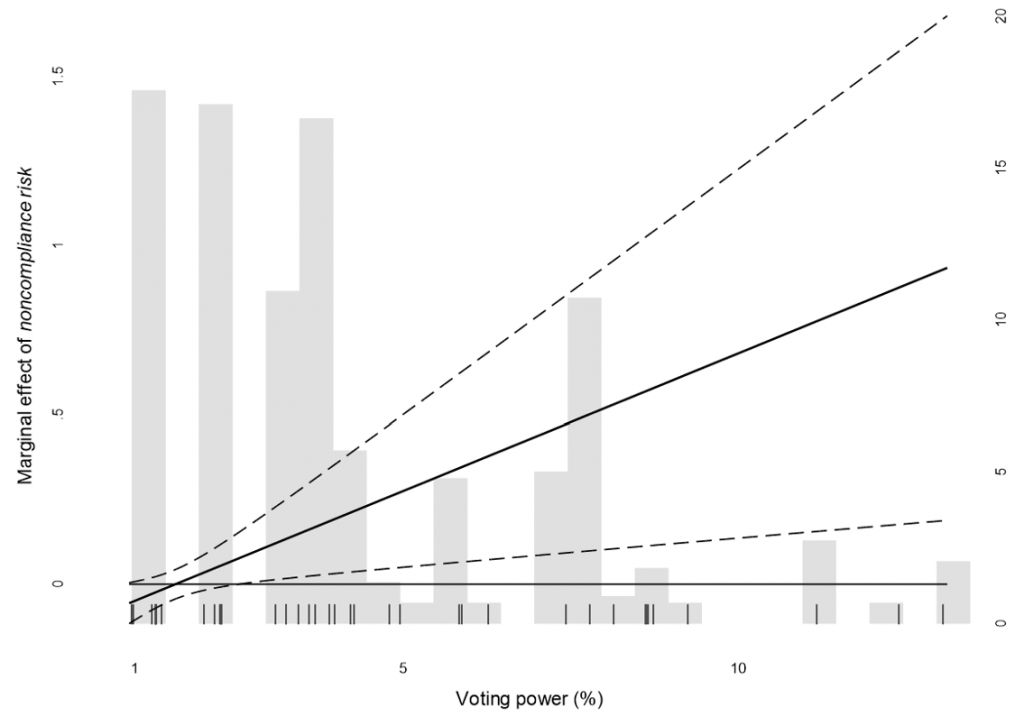The design of the EU’s system of economic governance has caused frequent disagreements between member states. Drawing on a new study, Fabio Franchino and Camilla Mariotto demonstrate how the risks posed to member states from noncompliance and the distribution of bargaining power in the Council help explain the stances governments have taken on economic governance reforms.
On 21 July 2010, Wolfgang Schäuble, the German Minister of Finance, and Christine Lagarde, the French Minister of Economy, sent a letter to the President of the European Council, Herman Van Rompuy, as a contribution to the discussion on the ongoing reform of the EU’s economic governance.
They argued that this regime needed “effective enforcement of economic surveillance through appropriate sanctions”. Countries that repeatedly failed to comply with the rules established by the Stability and Growth Pact must be subject to “political sanctions such as suspension of voting rights”. Other countries, such as Slovakia, argued for even stronger measures, such as exit from the euro area. These positions failed to gain a sufficient majority. Deposits and fines remained set at 0.2% of the offending country’s gross domestic product.
This example illustrates one of the main contested issues that have emerged during the negotiations over the reforms of economic governance rules that took place between 1997 and 2012. In a recent study, we explain why EU governments took different positions.
Noncompliance risk, asymmetric power and the design of enforcement
Most of these conflicts can be traced back to three overarching issues: a) the level of national discretion in implementing this regime, and the level of involvement of b) the Council and c) the Commission in its enforcement. We put forward a set of expectations on how the risk of noncompliance and the power asymmetry among countries shape governments’ positions on discretion and enforcement design.
First, depth of cooperation and risk of noncompliance are intrinsically linked. If a government wants to avoid the costs associated with an infringement (such as pecuniary sanctions, audience, and reputational costs), it is likely to support provisions that expand national discretion, that is, allow for shallower cooperation, and reduce the risk of breaching such an agreement. In other words, governments at greater risk of noncompliance should push for a more discretionary application of the regime.
Second, following liberal intergovernmentalism, we should expect governments that anticipate greater difficulties in complying to be more reluctant to delegate enforcement prerogatives to a supranational agency such as the Commission. This expectation may however be problematic if it is viewed as a choice between the Council and the Commission. From this perspective, we should expect governments, especially those at greater risk of noncompliance, to prefer the enforcement procedure over which they can exercise more influence.
Smaller states may favour centralisation (delegation) because equal treatment within the Commission (each state has its own commissioner) increases their influence, while the Council gives larger states more influence when it decides by qualified majority voting. Would small states that anticipate compliance problems still prefer empowering the Commission rather than the Council? Would large states that expect to be compliant prefer retaining control over enforcement in the Council rather than diluting their influence in the Commission? How do size (power asymmetry) and risk of noncompliance concurrently shape attitudes toward enforcement design?
Larger states at risk of noncompliance may push for a Council-based procedure over which they have more sway, while smaller states in a similar position may find themselves in a conundrum. On the one hand, centralised enforcement could be more attractive as it bestows on them more influence than a Council-based procedure. On the other hand, they may be reluctant to empower a Commission too zealous in enforcing the rules.
An empirical test
We have collected information on the positions that governments took over enforcement-relevant contested issues that characterised the negotiations over the economic governance reforms. Our findings illustrate some interesting dynamics.
As expected, we find that governments facing greater risk of noncompliance not only prefer greater discretion (looser cooperation) but also more Council involvement in enforcement if they enjoy higher voting power (more power) within this institution. As illustrated in Figure 1, governments exceeding a voting power index of three percent (i.e. the Swedish government’s index in 2011) are more likely to prefer greater Council involvement as their risk of noncompliance increases. Above this threshold, governments supporting more involvement have a mean debt-GDP ratio (our measure of the risk of noncompliance) that is almost twenty-nine percentage points higher than that of governments supporting less involvement.
Figure 1: Marginal effect of noncompliance risk on preferring more Council involvement, over voting power
Note: For more information, see the authors’ accompanying paper in European Union Politics.
Keeping all other covariates at their means, if a large country like Italy were to face an increase in noncompliance risk (specifically, a standard deviation increase in the debt-GDP ratio over the overall mean), the probability that its government would support more discretionary Council involvement increases by a very substantial forty-five percentage points. If the Maltese government were in the same situation, such probability would actually drop by slightly more than one percentage point, which differs insignificantly from zero. In sum, noncompliance risk and power resources (size) are strong predictors of positions on implementing discretion and the Council’s involvement in enforcement.
Matters are however more complicated with regard to the prerogatives of the Commission. These factors do partially explain attitudes towards the role of the Commission. In some cases, different power resources drive support for empowering this institution, with smaller states displaying greater enthusiasm and larger ones more reluctance. However, in other circumstances, expectations of compliance problems make governments of smaller countries more hesitant, especially when the Commission is perceived as a tough enforcer.
It is not easy for these governments to get out of this conundrum and it is perhaps because of this indeterminacy that we find national public support for the EU to offer guidance to governments’ positions. A standard deviation decrease in diffuse public support decreases by fourteen percentage points the probability of a government preferring greater involvement of the supranational executive.
Given the growing mass politicisation of EU politics, this increasing role of public opinion deserves greater scholarly attention, especially for the reform of the Stability and Growth Pact that may take place after the pandemic.
For more information, see the authors’ accompanying paper in European Union Politics
Note: This article gives the views of the authors, not the position of EUROPP – European Politics and Policy or the London School of Economics. Featured image credit: European Council






